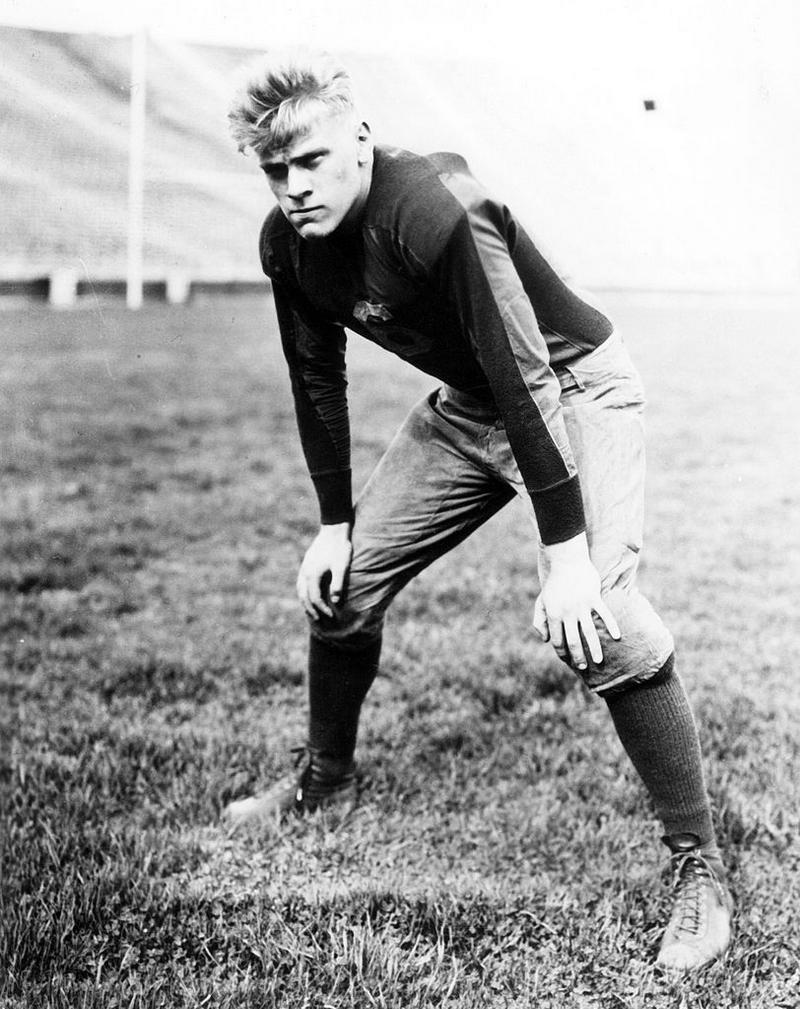Gerald Ford Fought Racism with Football
By Karen Harris | November 14, 2022

Gerald Ford, the 38th President of the United States, may have taken an unconventional road to the White House, thanks to Richard Nixon’s resignation, but on the football field, he was known for running the ball up the middle and making the big plays. As we will see, Ford was one of our most athletic former presidents who was a standout on and off the gridiron. But did you know that he once used his football clout to combat racism? Let’s learn how this happened.
Gerald Ford, Athlete
Gerald Ford was a big man on campus at his high school, South High School in Grand Rapids, Michigan. He was an excellent student and graduated in the top five percent of his class in 1931. He was a whiz at history and government and was named the most popular senior by his classmates. When he wasn’t in class, Ford could be found at his part-time job at a local restaurant or on the football field. He was the center on the offensive line of his high school football team. His senior year, Ford was named one of the best players in the state and was recruited by the prestigious University of Michigan. U of M made him a scholarship member of their football team, the Wolverines.
A College Standout
Gerald Ford excelled in college. Academically, he was a top student and majored in economics. He worked several different part-time jobs while he was in college to help pay for his education. But it was on the football team where Ford really made his name.
As starting center, Ford was a member of the team when they won back-to-back National Championships, in 1932 and 1933. In 1934, his teammates voted him the most valuable player on the team. In 1934, Ford’s senior year, however, the Wolverines had a down year. In fact, they won only one game that year.

Gerald Ford and Willis Ward
Ford’s best friend on the University of Michigan football team was Willis Ward, an African American. The two roomed together for all the team’s road trips. Ford admired Ward for his work ethic on and off the field and the two shared an interest in political and social justice. He treated his friend as an equal. But it was 1934 and not everyone followed suit.
Georgia Tech’s Coach
William “Bill” Anderson was the head football coach and athletic director for Georgia Tech. He sent a letter to the Michigan athletic director, Fielding Yost, stating that his players would not take the field against an African American player. They wanted Ward benched for the upcoming Georgia Tech versus Michigan game. When the student body at U of M learned of this … and that Michigan was considering agreeing to the demand … there was an outcry on campus. Protests were planned. Petitions were circulated. The NAACP got involved. And even Time magazine covered the controversy. It drew nationwide attention. But not everyone was on the same side. Many of the protests at U of M pushed for Ward to be dismissed from the team for no other reason than his skin color. The top administrators at U of M also voiced their opinion that Ward should not be on the team.

Outrage and Redemption
Gerald Ford was furious with the university administrators, his athletic director, and many of his fellow students. He went to the coach and threatened to quit the team if Ward was asked to leave. A bit of a compromise took place. The University of Michigan asked Ward to stand down for the Georgia Tech game, but he was allowed to remain on the team for the remainder of the season’s schedule. Ford was ready to make good on his threat to quit, but Ward personally asked him to stay on the team and play in the Georgia Tech game. After a long talk with his best friend, Ford agreed to play in the game.
Willis Ward was not on the bench during the Georgia Tech game, which took place on October 20, 1934. The Wolverine players were whipped into a frenzy about the situation and took it out on the Georgia Tech team. Before a crowd of 20,000 fans, they beat Georgia Tech 9-2. This was Michigan’s only win of the season.
As for Willis ward, he returned to the team for the following week’s game and played for the rest of the season. In fact, Ward scored every one of Michigan's points that season, outside the Georgia Tech game. Not one Wolverine scored the rest of that season, not even a field goal.
The Rest of the Story
After graduating from the University of Michigan, Ford went to law school at Yale where he also coached their football team. When he entered politics, Ford never forgot the anger he felt as he watched his best friend endure a very public display of racism. The incident shaped his political views. He proudly supported the Civil Rights Act and the Voting Rights Act. As for Willis Ward, he too, became a lawyer. He earned his law degree from Detroit College of Law in 1939 and had a long and distinguished career as a lawyer and then a judge.